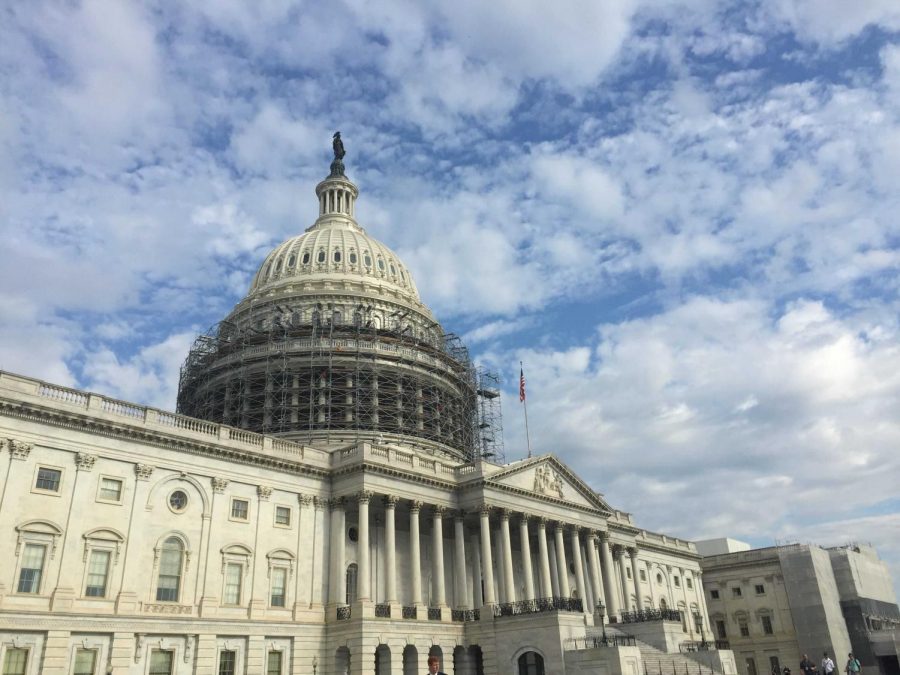Op-ed: Anti-Great — Why common citizens belong in government
Photo Courtesy of Brittany Mendez
Elected officials in the United States are almost always from elite, wealthy backgrounds. This needs to change.
February 19, 2021
I have struggled recently to understand the following contradiction: How can the majority of Americans be well-represented in politics when it is our wealthiest citizens who secure positions in the nation’s highest offices? From my perspective, these “greats” of society have no place serving as our voice in government.
Donald Trump’s loss to President Joe Biden was absolutely a step in the right direction. Yet, after the siege on our Capitol, I started to question why Americans would turn to violence in support of someone so removed from the average individual. After being unable to reach a satisfying conclusion, I decided it was a waste of my time — as well as a detriment to my mental health — to try to figure out why irrational nationalists act a certain way. I believe they are mostly fueled by a sense of superiority over others rather than actual love for their country.
Excluding the radicals who raided the Capitol, I am confident many other Americans are trying to determine if common people were ever meant to have a place in politics, or if positions in government are exclusively for the wealthy and privileged. During the American Revolution, anti-federalist Melancton Smith spread awareness about the dangers posed when the “greats” of society become our representatives, arguing instead that commoners would be better suited for political office. This opinion is more relevant now than ever.
Reading Smith’s views on representation is essential for recognizing why we need to oppose electing privileged individuals to state and federal government and work towards replacing them with relatable citizens through the ballot box. I forgot about Melancton Smith until I was packing for a move last week and came across a copy of “The Anti-Federalists Papers” from my undergraduate studies buried in the bottom of a box. As I re-read the book, I gained the following perspective on representation.
The papers reminded me of how, back in 1788, the New York Ratifying Convention hosted pivotal debates about governance that would create new institutions and determine our nation’s history. Following New Hampshire’s and Virginia’s ratification, New York certainly felt the pressure to follow suit and ratify the Constitution. During all of this political contention, Smith, a New York delegate, presented his views on the type of citizens who should be representatives. Smith told Alexander Hamilton and other delegates that a “…representative body, composed principally of respectable yeomanry is the best possible security to liberty,” and stressed that our government should not “fall into the hands of the few and the great.”
I view their idea of the “greats” as those individuals who are born with certain entitlements over others and cannot relate to the needs of the majority. These “greats” of society are currently far too prevalent in our government when compared to the number of working-class representatives who are today’s yeomanry. Smith worried that the “great consider themselves above the common people;” “do not associate with them;” and “fancy themselves to have a right of pre-eminence in every thing.” These sentiments still hold true today when applied to most of our representatives across local, state or federal government.
The more I read, the more comfort I found in Smith’s opinions. Time has unfortunately separated us from Smith’s philosophy. Trump is a modern “great,” and we have seen how he successfully leveraged his “greatness” and pathos as a Washington outsider to cause divisiveness — something I believe other unsavory politicians will continue to do in the future.
President Biden recognizes the value of diversity in terms of race/ethnicity and gender as evidenced by his Cabinet selections. However, the fact remains that Biden and many decision-makers in key positions within his administration are far wealthier than the average American. This means we still need to make changes.
Citizens can reshape our government so that it consists of non-elite representatives. The first step is simple — vote. It only takes a small amount of time to determine who is on the ballot and to research a candidate’s background. Find and support individuals who do not come from wealth, regardless of the election. Back those who you would consider working class.
We also must stop idolizing the one percent, even if the candidate is from your party. There is no correlation between having a prominent position in society and being an effective representative. Instead, show support for grassroots politicians, such as Rep. Alexandria Ocasio-Cortez, who are more likely to act in the interest of the majority.
Taking the actions above will form a more effective government that understands the needs of its people, ultimately improving the quality of life for Americans as a whole.
Alastair Huntley obtained a Bachelor of Arts in Studies in War and Peace with Honors from Norwich University, The Military College of Vermont. He is currently a first-year post-baccalaureate premedical student at Northeastern University. He can be reached at huntley.al@northeastern.edu.







